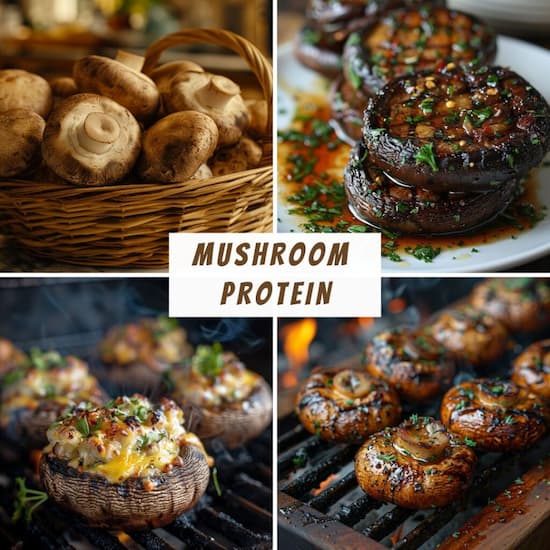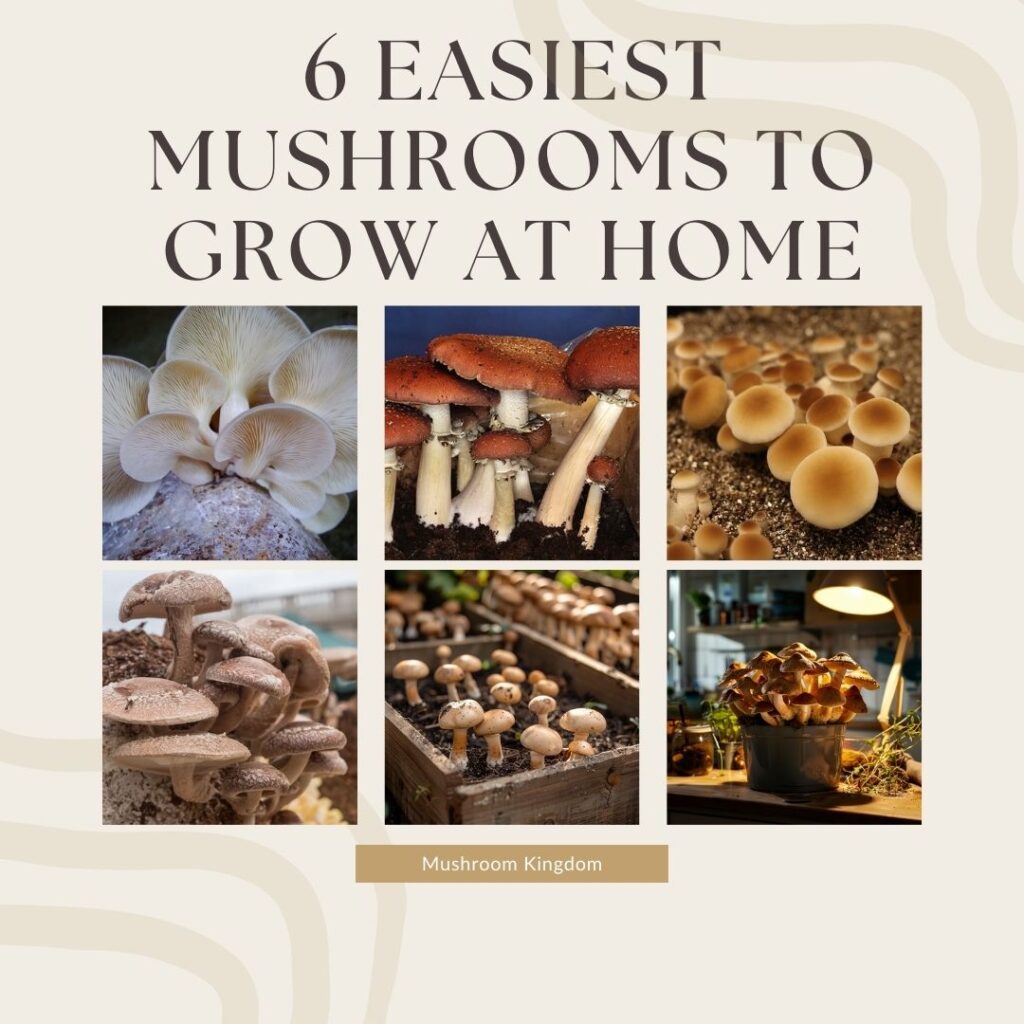Mushrooms, a staple in various cuisines worldwide, are often celebrated for their rich flavors and unique textures. However, when it comes to nutrition, many people don’t know that a lot of mushrooms contain protein.
So, this article goes deep into the mushroom protein content, their nutritional value, and their suitability for different dietary needs, including bodybuilding.

Do Mushrooms Have Protein?
Yes, mushrooms do contain protein. On average, mushrooms offer about 3–4 grams of protein per 100 grams. While this may seem modest compared to traditional protein sources like meat, eggs, or legumes, mushrooms can still contribute to your daily protein intake.
However, the protein content in mushrooms varies depending on the type and growing conditions.
For those following a plant-based diet or simply looking to diversify their protein sources, mushrooms can be a valuable addition.
They are low in calories and fat, making them an excellent choice for those who want to increase their nutrient intake without adding extra calories.
Protein Content in Different Types of Mushrooms
As the table shows, different types of mushrooms contain varying levels of protein. Portobello mushrooms, for instance, are among the highest in protein, while others like Maitake are lower. Nevertheless, even those with lower protein content can contribute to a well-rounded diet when combined with other protein-rich foods.
| Type of Mushroom | Protein per 100g (grams) |
| White Button | 3.1 |
| Shiitake | 2.2 |
| Portobello | 3.6 |
| Oyster | 3.3 |
| Maitake | 1.9 |
| Enoki | 2.7 |
Mushroom Protein Quality
Though they have decent amount of protein, understanding protein quality is key when evaluating the nutritional value of mushrooms. Protein quality is determined by the presence and balance of essential amino acids — those that our bodies cannot produce and must be obtained from our diet.
Complete proteins, which contain all nine essential amino acids in the correct proportions, are typically found in animal products.
Mushrooms, while nutritious, are not complete proteins. They do contain a range of amino acids, but not in the quantities needed to be classified as a complete protein. For instance, mushrooms are particularly high in glutamic acid, which is important for brain health and immune function. They also provide other amino acids like arginine and leucine, but in smaller amounts.
How to Complement Mushroom Protein
One of the best ways to make the most of mushroom protein is by pairing them with other foods that complement their amino acid profile. For example:
- Grains: Combining them with grains like rice or quinoa can help create a more complete protein. Grains are typically low in lysine but contain methionine, which mushrooms also lack in high amounts.
- Legumes: Beans and lentils are high in lysine and other essential amino acids that shrooms lack. Mixing these with mushrooms in dishes like stir-fries or stews can enhance the overall protein quality of the meal.
- Nuts and Seeds: Adding nuts or seeds, which are rich in protein and healthy fats, to mushroom dishes can further boost the amino acid profile.
By strategically pairing mushrooms with these complementary foods, you can enhance the nutritional value of your meals and ensure you’re getting a more complete set of amino acids.
Which Mushroom Has the Most Protein?
Among the various types of mushrooms, Portobello stand out with the highest protein content. With approximately 3.6 grams of protein per 100 grams, Portobellos not only provide a good amount of protein but also offer a meaty texture that makes them a popular choice in vegetarian and vegan dishes.
Why Portobello Mushrooms Are Popular
Portobello are not just favored for their protein content; they are also loved for their versatility. Their large, flat caps can be grilled, stuffed, or used as a meat substitute in sandwiches and burgers. This makes them an excellent option for those looking to reduce their meat consumption without sacrificing flavor or texture.
Other types like white button and oyster also offer a decent amount of protein, though slightly less than Portobellos. However, all mushrooms bring their own unique flavors and nutritional benefits, making it worthwhile to include a variety in your diet.
How to Maximize Protein Intake from Mushrooms
If you want to get the most protein out of your mushrooms, consider the following tips:
- Cooking Methods: Cooking mushrooms reduces their water content, making the protein more concentrated. Sautéing or grilling can help retain most of the protein content while enhancing flavor.
- Pair with Protein-Rich Ingredients: Combine them with tofu, tempeh, or legumes to create protein-packed meals. For example, a stir-fry with tofu and mushrooms provides a satisfying, high-protein dish.
- Incorporate into Protein-Rich Meals: Add mushrooms to meals that already have a good protein base. For instance, they can be added to an omelet, pasta with meat sauce, or a quinoa salad.
Is There a Mushroom Coffee with Protein?
Mushroom coffee is a trend that has gained popularity for its potential health benefits. Typically, mushroom coffee blends contain powdered medicinal mushrooms like Chaga, Lion’s Mane, or Reishi mixed with coffee.
These types are known for their antioxidant and adaptogenic properties, which may help reduce stress and improve cognitive function.
Protein Content in Mushroom Coffee
However, when it comes to protein, mushroom coffee falls short. The medicinal types used in these blends are not chosen for their protein content. Instead, they are valued for their potential to boost immunity, enhance mental clarity, and support overall well-being.
The actual protein content in these coffee blends is negligible, unless protein is specifically added through ingredients like collagen, whey, or plant-based protein powders.
Some brands are now offering coffee with added protein to appeal to those looking for a more functional beverage. These products may contain added sources of protein, such as pea protein or collagen, providing a small protein boost in your morning cup.
Mushroom vs. Meat Protein
When comparing mushroom protein to meat protein, the differences are significant. Meat, particularly lean cuts like chicken breast, is a complete protein source, containing all the essential amino acids your body needs. It is also more protein-dense, with chicken breast providing around 31 grams of protein per 100 grams, compared to the 3–4 grams found in shrooms.
Nutritional Differences Between Mushrooms and Meat
Despite the lower protein content, mushrooms offer several nutritional advantages over meat:
- Low in Calories and Fat: They are naturally low in calories and contain virtually no fat, making them an ideal choice for those looking to manage their weight or reduce fat intake.
- Rich in Fiber: Unlike meat, shrooms contain dietary fiber, which is important for digestive health and can help you feel full and satisfied after meals.
- Packed with Antioxidants: They are a rich source of antioxidants like selenium and ergothioneine, which help protect cells from damage and support immune function.
- No Cholesterol: Shrooms are cholesterol-free, making them a heart-healthy option, especially for those monitoring their cholesterol levels.
| Nutrient | Chicken Breast (100g) | Portobello Mushroom (100g) |
| Protein | 31g | 3.6g |
| Calories | 165 | 22 |
| Fat | 3.6g | 0.3g |
| Fiber | 0g | 1g |
| Cholesterol | 85mg | 0mg |
| Selenium | 20mcg | 5.6mcg |
Is Mushroom Protein Good for Bodybuilding?
When it comes to bodybuilding, protein is crucial for muscle growth and repair. Typically, bodybuilders focus on high-protein diets that include complete proteins to ensure they get all the essential amino acids necessary for muscle synthesis.
Can Mushrooms Support Muscle Growth?
Mushroom protein alone may not be sufficient to meet the high protein demands of bodybuilding, especially if consumed in isolation.
However, they can still be beneficial in a bodybuilder’s diet when combined with other protein sources.
Their low calorie and fat content make them a great addition to meals without adding unnecessary bulk, and their rich array of vitamins and minerals can support overall health and recovery.
For instance, some shrooms provide B vitamins, which are essential for energy metabolism and can help bodybuilders maintain their energy levels during intense training sessions.
They also contain antioxidants like selenium, which can reduce oxidative stress and inflammation after workouts, promoting faster recovery.
Incorporating Mushrooms into a Bodybuilding Diet
Bodybuilders can incorporate mushrooms into their diet by using them as a complementary ingredient in high-protein meals. For example:
- Mushroom and Chicken Stir-Fry: Combine them with chicken or turkey in a stir-fry for a protein-rich, nutrient-dense meal.
- Mushroom Omelet: Add them to an egg-white omelet for a low-calorie, high-protein breakfast that also provides important micronutrients.
- Mushroom and Lentil Soup: Create a hearty soup with mushrooms and lentils, both of which provide different types of protein and a range of essential nutrients.
By combining mushrooms with other protein sources, bodybuilders can enhance the nutritional diversity of their diets, supporting both muscle growth and overall health.
What Vitamins and Minerals Do Mushrooms Have?
Beyond protein, mushrooms are a powerhouse of essential vitamins and minerals that contribute to overall health. They are particularly rich in B vitamins, which play a critical role in energy production, brain function, and the maintenance of healthy skin and muscles.
| Nutrient | Role in the Body | Mushroom |
| Vitamin D | Bone health, immune function | Maitake, Shiitake |
| B Vitamins (B2, B3, B5) | Energy production, brain function | White button, Portobello |
| Selenium | Antioxidant defense, thyroid function | White button, Shiitake |
| Copper | Red blood cell formation, cardiovascular health | Shiitake, Oyster |
| Potassium | Fluid balance, muscle contraction | White button, Crimini |
| Ergothioneine | Antioxidant properties, cellular protection | King Oyster, Shiitake |
Importance of Vitamins and Minerals in Mushrooms
- Vitamin D: Vitamin D is crucial for bone health, as it aids in calcium absorption. It also plays a role in immune system regulation.
- B Vitamins: These vitamins are vital for converting food into energy and supporting brain health. For example, vitamin B2 (riboflavin) helps maintain healthy red blood cells, while vitamin B3 (niacin) supports skin health and digestion.
- Selenium: Selenium is an essential trace mineral that functions as an antioxidant, protecting cells from damage. It also supports thyroid function, which is important for regulating metabolism.
- Copper: Copper is involved in the formation of red blood cells and helps maintain healthy bones, blood vessels, and nerves. It also plays a role in iron absorption.
- Potassium: Potassium helps regulate fluid balance in the body, supports muscle contractions, and plays a role in maintaining normal blood pressure levels.
- Ergothioneine: Ergothioneine is a unique antioxidant found in mushrooms that helps protect cells from oxidative damage. This compound is being studied for its potential role in reducing the risk of chronic diseases.
Conclusion
While mushrooms may not be a top-tier protein source compared to meat or legumes, they offer a host of other nutritional benefits that make them an important part of a balanced diet.
They provide a modest amount of protein along with a wide range of vitamins, minerals, and antioxidants that support overall health.
Whether you’re looking to reduce meat consumption, add variety to your meals, or enhance your diet with nutrient-rich foods, shrooms are a versatile and valuable choice.


